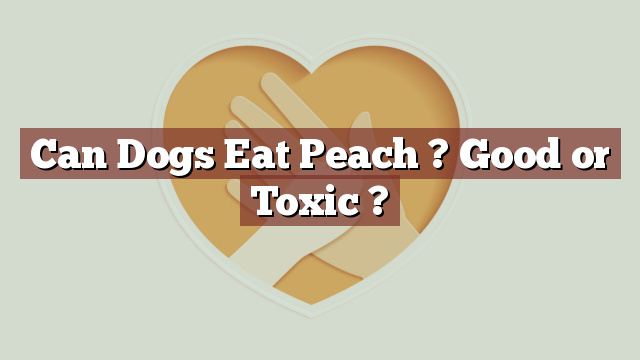Can Dogs Eat Peach? Good or Toxic?
Knowing what foods are safe for our furry friends is crucial in ensuring their overall well-being and health. One fruit that often raises questions among dog owners is the peach. In this article, we will explore whether dogs can eat peach and whether it is good or toxic for them.
Nutritional Value of Peach: Vitamins, Minerals, and Fiber
Peaches are not only delicious and juicy but also packed with essential nutrients. They are a rich source of vitamins A and C, which play a vital role in maintaining a dog’s immune system and promoting healthy vision. Additionally, peaches contain minerals such as potassium and magnesium, which are necessary for proper muscle function and cardiovascular health. Furthermore, the fiber content in peaches can contribute to good digestive health in dogs.
Can Dogs Eat Peach? Safety and Toxicity Explained
Can dogs eat peach? The answer is yes, but with caution. While peaches are generally safe for dogs to consume, there are a few precautions to keep in mind. The most important thing to remember is to remove the peach pit, as it poses a choking hazard and contains a small amount of cyanide, which can be toxic to dogs. Furthermore, the peach skin may be difficult for some dogs to digest, so it is recommended to peel the peach before offering it to your furry friend.
Potential Risks or Benefits: Digestive Issues vs. Nutritional Benefits
While peaches can provide dogs with various nutritional benefits, including vitamins and minerals, they can also potentially cause digestive issues. Some dogs may experience upset stomach, diarrhea, or vomiting if they consume too much peach or if they have a sensitive digestive system. It is important to introduce peaches gradually into your dog’s diet and monitor their reaction to ensure they tolerate it well.
If Your Dog Eats Peach: Symptoms, Treatment, and When to Seek Help
If your dog accidentally ingests peach, it is essential to be aware of any potential symptoms or adverse reactions. Signs of discomfort or toxicity may include difficulty breathing, dilated pupils, drooling, or weakness. If you notice any of these symptoms or if your dog exhibits unusual behavior after consuming peach, it is advisable to seek veterinary assistance immediately. A professional can provide appropriate treatment and guidance based on your dog’s individual situation.
Conclusion: Moderation and Veterinary Guidance Are Key
In conclusion, dogs can eat peach, but it should be done in moderation and with caution. While peaches offer valuable nutrients, the pit and skin must be removed to prevent choking and potential toxicity. Additionally, monitoring your dog’s reaction to peach and consulting with a veterinarian is essential, especially if your dog has any underlying health conditions or sensitivities. As responsible dog owners, it is our duty to ensure that we make informed choices about the foods we offer our furry companions.
Thank you for investing your time in exploring [page_title] on Can-Eat.org. Our goal is to provide readers like you with thorough and reliable information about various dietary topics. Each article, including [page_title], stems from diligent research and a passion for understanding the nuances of our food choices. We believe that knowledge is a vital step towards making informed and healthy decisions. However, while "[page_title]" sheds light on its specific topic, it's crucial to remember that everyone's body reacts differently to foods and dietary changes. What might be beneficial for one person could have different effects on another. Before you consider integrating suggestions or insights from "[page_title]" into your diet, it's always wise to consult with a nutritionist or healthcare professional. Their specialized knowledge ensures that you're making choices best suited to your individual health needs. As you navigate [page_title], be mindful of potential allergies, intolerances, or unique dietary requirements you may have. No singular article can capture the vast diversity of human health, and individualized guidance is invaluable. The content provided in [page_title] serves as a general guide. It is not, by any means, a substitute for personalized medical or nutritional advice. Your health should always be the top priority, and professional guidance is the best path forward. In your journey towards a balanced and nutritious lifestyle, we hope that [page_title] serves as a helpful stepping stone. Remember, informed decisions lead to healthier outcomes. Thank you for trusting Can-Eat.org. Continue exploring, learning, and prioritizing your health. Cheers to a well-informed and healthier future!

